外研版(2019) 必修第二册 Unit 6 Earth First UsingLanguageGrammar课件(25张)
文档属性
| 名称 | 外研版(2019) 必修第二册 Unit 6 Earth First UsingLanguageGrammar课件(25张) |  | |
| 格式 | zip | ||
| 文件大小 | 56.5MB | ||
| 资源类型 | 教案 | ||
| 版本资源 | 外研版(2019) | ||
| 科目 | 英语 | ||
| 更新时间 | 2022-04-09 21:38:07 | ||
图片预览


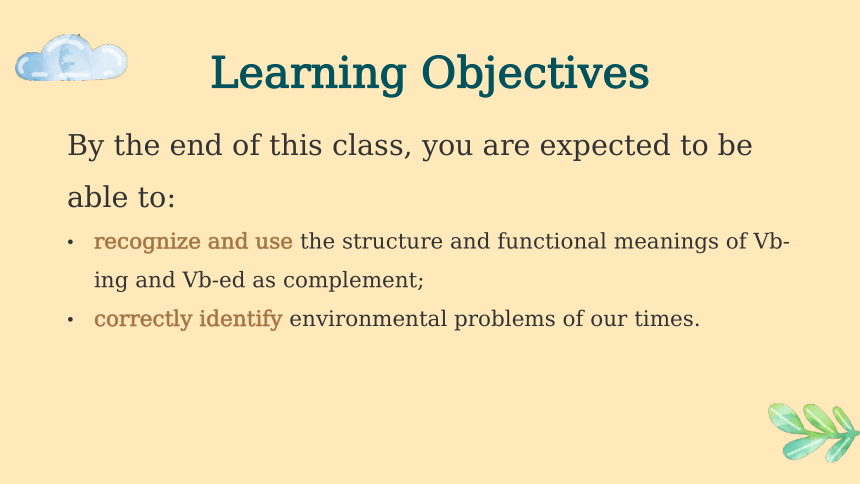
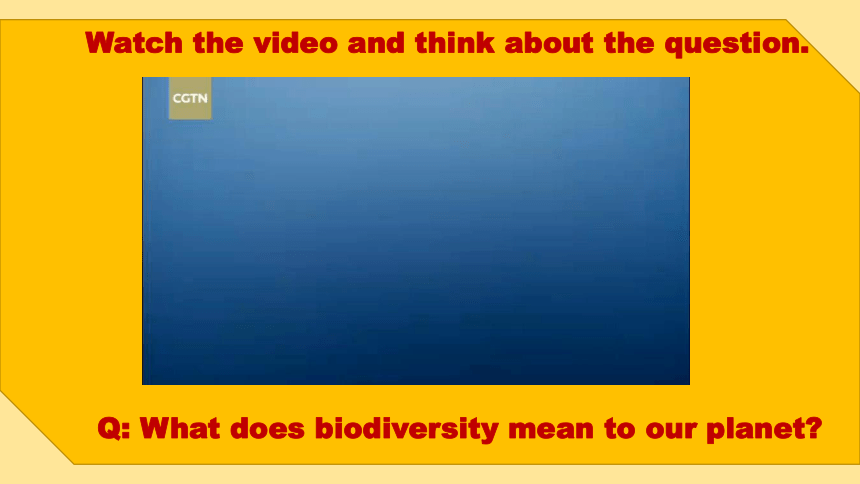
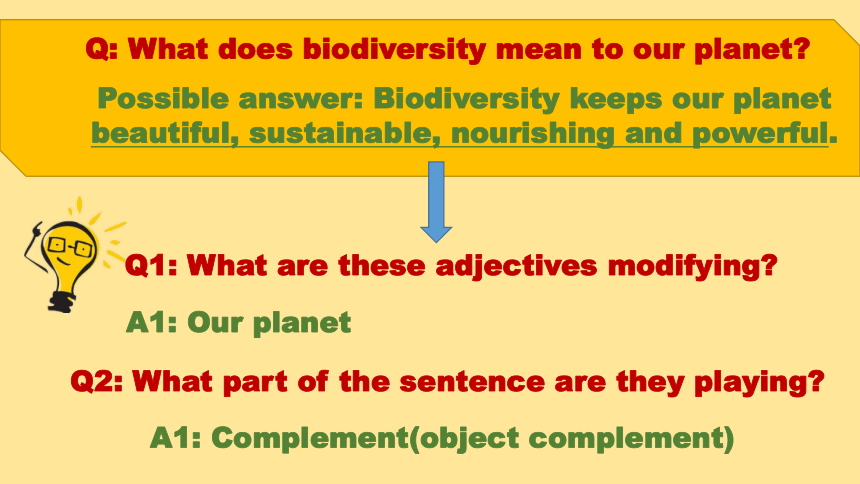
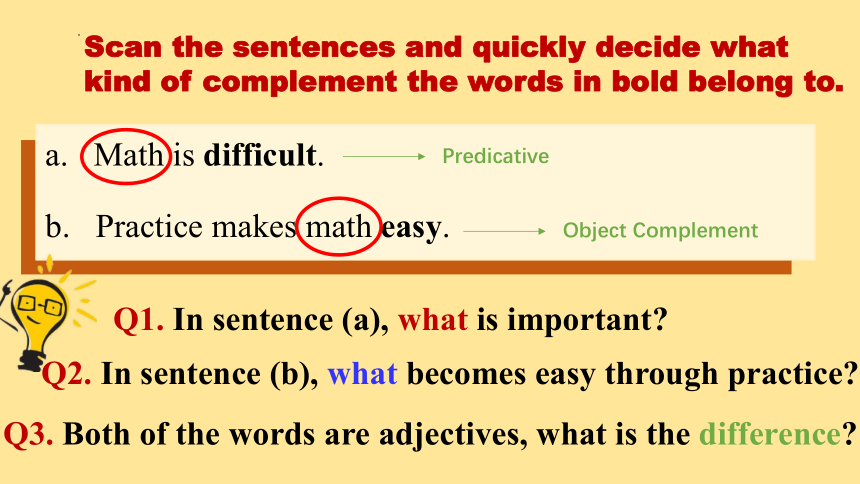
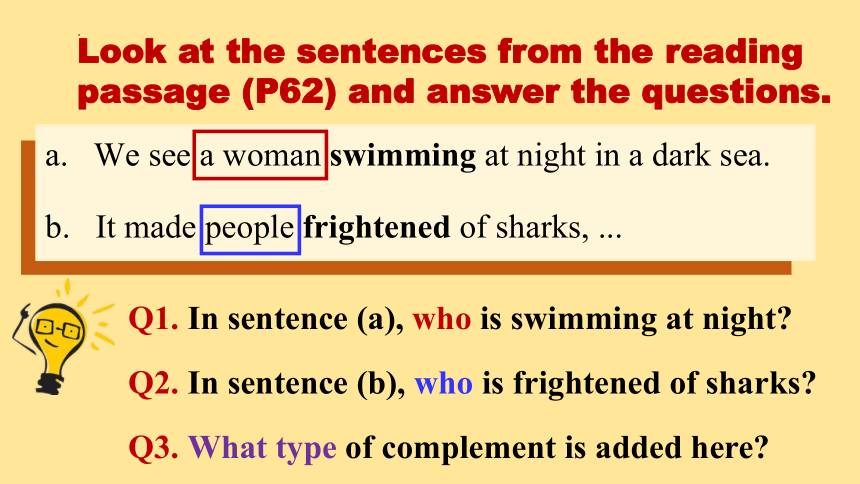
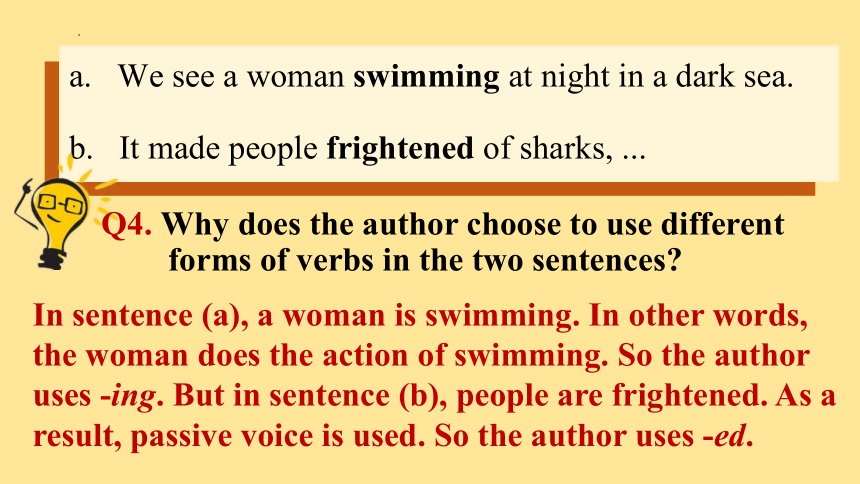
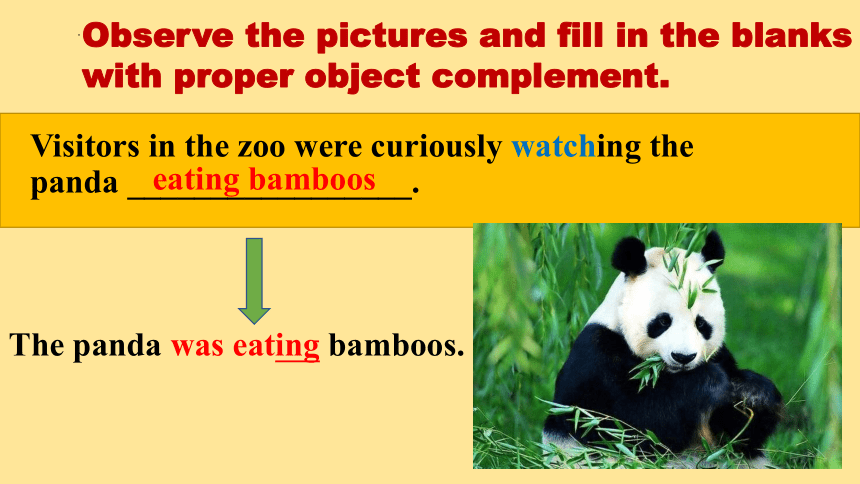
文档简介
(共25张PPT)
大观念视角下的单元整体学习
主题语境 “人与自然”——关爱地球、保护环境
正视环保问题
单元大观念:正视全球面临的环保问题,了解先进的环保理念,增强环保意识,践行绿色生活方式,树立共同关爱地球,保护环境,与自然和谐相处的价值观。
子主题
Period 1
Starting out & Vocabulary
感知环境问题;学习主题语块
把握主题,建立各语篇关联,形成大观念
Period 3
Using language: Grammar
关注海洋环境;聚焦人类活动
Period 4
Listening & Speaking
讨论雾霾污染;礼貌打断他人
增强环保意识
践行环保理念
Period 2
Understanding ideas
打破传统观念;重新认识鲨鱼
Period 5
Developing ideas
了解先进理念;真正绿色生活
Period 6
Writing
宣传光盘行动;环保共同参与
Period 7
Presenting ideas & Reflection
关注“碳足迹”;回顾单元内容
Book 2 Unit 6
Earth first
-ing and –ed as complement.
Period 3 Using Language Grammar
Learning Objectives
By the end of this class, you are expected to be able to:
recognize and use the structure and functional meanings of Vb-ing and Vb-ed as complement;
correctly identify environmental problems of our times.
Watch the video and think about the question.
Q: What does biodiversity mean to our planet
Q: What does biodiversity mean to our planet
Possible answer: Biodiversity keeps our planet beautiful, sustainable, nourishing and powerful.
Q1: What are these adjectives modifying
Q2: What part of the sentence are they playing
A1: Our planet
A1: Complement(object complement)
Math is difficult.
b. Practice makes math easy.
Q1. In sentence (a), what is important
Scan the sentences and quickly decide what kind of complement the words in bold belong to.
Q2. In sentence (b), what becomes easy through practice
Q3. Both of the words are adjectives, what is the difference
Predicative
Object Complement
We see a woman swimming at night in a dark sea.
b. It made people frightened of sharks, ...
Q1. In sentence (a), who is swimming at night
Look at the sentences from the reading passage (P62) and answer the questions.
Q2. In sentence (b), who is frightened of sharks
Q3. What type of complement is added here
We see a woman swimming at night in a dark sea.
b. It made people frightened of sharks, ...
Q4. Why does the author choose to use different
forms of verbs in the two sentences
In sentence (a), a woman is swimming. In other words, the woman does the action of swimming. So the author uses -ing. But in sentence (b), people are frightened. As a result, passive voice is used. So the author uses -ed.
Observe the pictures and fill in the blanks with proper object complement.
Visitors in the zoo were curiously watching the panda _________________.
eating bamboos
The panda was eating bamboos.
We are constantly seeing humans _____________ in pursuit of their fins.
hunting sharks
Humans were hunting sharks for their fins.
Observe the pictures and fill in the blanks with proper complement accordingly.
-ing as complement
1) see, watch, hear, feel, smell, find, listen to, look at, notice, observe, catch等感官动词(perceptives)后接现在分词作宾语补足语,表示该动作正在进行。
Do you hear someone calling for help
I felt a hand touching my shoulder.
Can you smell something burning
I found the dog biting the sofa.
Would you please listen to the professor introducing garbage sorting
They observed him entering the bank.
You wouldn’t catch me working on a Saturday!
We are constantly seeing humans hunting sharks in pursuit of their fins.
Visitors in the zoo were curiously watching the panda eating bamboos.
We should not stand by and leave all those plastic wastes________________ forever.
lying on the beach
Plastic wastes are lying on the beach.
Observe the pictures and fill in the blanks with proper complement accordingly.
We should have factories _____________________ in order to save our planet.
producing less emissions
Factories should have been producing less emissions.
Observe the pictures and fill in the blanks with proper complement accordingly.
-ing as complement
2) keep, have, get, leave, set等使役动词(causatives)后接现在分词作宾语补足语,表示“使处于某种状态”。
Sorry, I’ve kept you waiting a long time.
He had us laughing during the lunchtime.
Can you really get that old car going again
Don’t leave her standing outside in the rain.
Her words set me thinking about saving energy.
We should not stand by and leave all those plastic wastes lying on the beach forever.
We should have factories producing less emissions in order to save our planet.
We gladly see country’s carbon footprint ________ by 50% till now.
reduced
The country’s carbon footprint has been reduced by 50% till now.
Observe the pictures and fill in the blanks with proper complement accordingly.
The kitty returned to its hometown years later and found the river it once fished in _______________.
heavily polluted
The river was heavily polluted.
Observe the pictures and fill in the blanks with proper complement accordingly.
-ed as complement
1) see, hear, notice, observe, watch, feel, find 等感官动 词(perceptives)后接过去分词作宾语补足语,表示该动作与宾语之间是被动关系或者该动作已经完成。
We will see the plan carried out next year.
When I heard my song sung by everyone, I knew I made it.
I noticed the breakfast made when I went into the kitchen.
I observed her hairstyle changed.
He felt his feet pulled by something.
She found her car gone.
The campsite is such a beautiful place. We should get it ____________ after enjoying a picnic here.
cleaned up
The campsite should be cleaned up.
Observe the pictures and fill in the blanks with proper complement accordingly.
2) have, get, make, leave, keep 等使役动词(causatives)后接过去分词作宾语补足语,表示动作由他人完成。
-ed as complement
I raised my voice to make myself heard.
She got her tooth pulled out.
We had the engine repaired.
Sometimes it’s better to leave some things unsaid.
Please keep us informed of the latest development.
Read the passage (P65) and choose the correct form of the verbs. Pay attention that the options are not necessarily complements.
Attracted / Attracting by mermaids since she was a child, Hannah Fraser created her first tail when she was only nine years old. Now, she is a model and performance artist devoted / devoting to ocean conservation. She can be seen worn / wearing mermaid clothing and dived / diving up to 50 feet underwater to swim with dolphins, sharks and whales.
Rewrite the underlined sentences in the interview (P65), using the V-ing and
V-ed forms as complement to make it more compact and coherent.
Here, you can see dramatic landscapes. They change from
mountains to grasslands, forests to rivers.
In recent years, we have seen large areas of wetland that
were damaged by human activity.
Here, you can see dramatic landscapes changing from mountains to grasslands, forests to rivers.
In recent years, we have seen large areas of wetland damaged by human activity.
This includes keeping the original environment untouched, …
This includes keeping the original environment from
being touched, ...
PERCEPTIVES
CAUSATIVES
-ing
-ed
OBJECT
see, watch, hear, feel, smell, find, listen to, look at, notice, observe
have, get, make, leave, keep
Thanks
大观念视角下的单元整体学习
主题语境 “人与自然”——关爱地球、保护环境
正视环保问题
单元大观念:正视全球面临的环保问题,了解先进的环保理念,增强环保意识,践行绿色生活方式,树立共同关爱地球,保护环境,与自然和谐相处的价值观。
子主题
Period 1
Starting out & Vocabulary
感知环境问题;学习主题语块
把握主题,建立各语篇关联,形成大观念
Period 3
Using language: Grammar
关注海洋环境;聚焦人类活动
Period 4
Listening & Speaking
讨论雾霾污染;礼貌打断他人
增强环保意识
践行环保理念
Period 2
Understanding ideas
打破传统观念;重新认识鲨鱼
Period 5
Developing ideas
了解先进理念;真正绿色生活
Period 6
Writing
宣传光盘行动;环保共同参与
Period 7
Presenting ideas & Reflection
关注“碳足迹”;回顾单元内容
Book 2 Unit 6
Earth first
-ing and –ed as complement.
Period 3 Using Language Grammar
Learning Objectives
By the end of this class, you are expected to be able to:
recognize and use the structure and functional meanings of Vb-ing and Vb-ed as complement;
correctly identify environmental problems of our times.
Watch the video and think about the question.
Q: What does biodiversity mean to our planet
Q: What does biodiversity mean to our planet
Possible answer: Biodiversity keeps our planet beautiful, sustainable, nourishing and powerful.
Q1: What are these adjectives modifying
Q2: What part of the sentence are they playing
A1: Our planet
A1: Complement(object complement)
Math is difficult.
b. Practice makes math easy.
Q1. In sentence (a), what is important
Scan the sentences and quickly decide what kind of complement the words in bold belong to.
Q2. In sentence (b), what becomes easy through practice
Q3. Both of the words are adjectives, what is the difference
Predicative
Object Complement
We see a woman swimming at night in a dark sea.
b. It made people frightened of sharks, ...
Q1. In sentence (a), who is swimming at night
Look at the sentences from the reading passage (P62) and answer the questions.
Q2. In sentence (b), who is frightened of sharks
Q3. What type of complement is added here
We see a woman swimming at night in a dark sea.
b. It made people frightened of sharks, ...
Q4. Why does the author choose to use different
forms of verbs in the two sentences
In sentence (a), a woman is swimming. In other words, the woman does the action of swimming. So the author uses -ing. But in sentence (b), people are frightened. As a result, passive voice is used. So the author uses -ed.
Observe the pictures and fill in the blanks with proper object complement.
Visitors in the zoo were curiously watching the panda _________________.
eating bamboos
The panda was eating bamboos.
We are constantly seeing humans _____________ in pursuit of their fins.
hunting sharks
Humans were hunting sharks for their fins.
Observe the pictures and fill in the blanks with proper complement accordingly.
-ing as complement
1) see, watch, hear, feel, smell, find, listen to, look at, notice, observe, catch等感官动词(perceptives)后接现在分词作宾语补足语,表示该动作正在进行。
Do you hear someone calling for help
I felt a hand touching my shoulder.
Can you smell something burning
I found the dog biting the sofa.
Would you please listen to the professor introducing garbage sorting
They observed him entering the bank.
You wouldn’t catch me working on a Saturday!
We are constantly seeing humans hunting sharks in pursuit of their fins.
Visitors in the zoo were curiously watching the panda eating bamboos.
We should not stand by and leave all those plastic wastes________________ forever.
lying on the beach
Plastic wastes are lying on the beach.
Observe the pictures and fill in the blanks with proper complement accordingly.
We should have factories _____________________ in order to save our planet.
producing less emissions
Factories should have been producing less emissions.
Observe the pictures and fill in the blanks with proper complement accordingly.
-ing as complement
2) keep, have, get, leave, set等使役动词(causatives)后接现在分词作宾语补足语,表示“使处于某种状态”。
Sorry, I’ve kept you waiting a long time.
He had us laughing during the lunchtime.
Can you really get that old car going again
Don’t leave her standing outside in the rain.
Her words set me thinking about saving energy.
We should not stand by and leave all those plastic wastes lying on the beach forever.
We should have factories producing less emissions in order to save our planet.
We gladly see country’s carbon footprint ________ by 50% till now.
reduced
The country’s carbon footprint has been reduced by 50% till now.
Observe the pictures and fill in the blanks with proper complement accordingly.
The kitty returned to its hometown years later and found the river it once fished in _______________.
heavily polluted
The river was heavily polluted.
Observe the pictures and fill in the blanks with proper complement accordingly.
-ed as complement
1) see, hear, notice, observe, watch, feel, find 等感官动 词(perceptives)后接过去分词作宾语补足语,表示该动作与宾语之间是被动关系或者该动作已经完成。
We will see the plan carried out next year.
When I heard my song sung by everyone, I knew I made it.
I noticed the breakfast made when I went into the kitchen.
I observed her hairstyle changed.
He felt his feet pulled by something.
She found her car gone.
The campsite is such a beautiful place. We should get it ____________ after enjoying a picnic here.
cleaned up
The campsite should be cleaned up.
Observe the pictures and fill in the blanks with proper complement accordingly.
2) have, get, make, leave, keep 等使役动词(causatives)后接过去分词作宾语补足语,表示动作由他人完成。
-ed as complement
I raised my voice to make myself heard.
She got her tooth pulled out.
We had the engine repaired.
Sometimes it’s better to leave some things unsaid.
Please keep us informed of the latest development.
Read the passage (P65) and choose the correct form of the verbs. Pay attention that the options are not necessarily complements.
Attracted / Attracting by mermaids since she was a child, Hannah Fraser created her first tail when she was only nine years old. Now, she is a model and performance artist devoted / devoting to ocean conservation. She can be seen worn / wearing mermaid clothing and dived / diving up to 50 feet underwater to swim with dolphins, sharks and whales.
Rewrite the underlined sentences in the interview (P65), using the V-ing and
V-ed forms as complement to make it more compact and coherent.
Here, you can see dramatic landscapes. They change from
mountains to grasslands, forests to rivers.
In recent years, we have seen large areas of wetland that
were damaged by human activity.
Here, you can see dramatic landscapes changing from mountains to grasslands, forests to rivers.
In recent years, we have seen large areas of wetland damaged by human activity.
This includes keeping the original environment untouched, …
This includes keeping the original environment from
being touched, ...
PERCEPTIVES
CAUSATIVES
-ing
-ed
OBJECT
see, watch, hear, feel, smell, find, listen to, look at, notice, observe
have, get, make, leave, keep
Thanks
